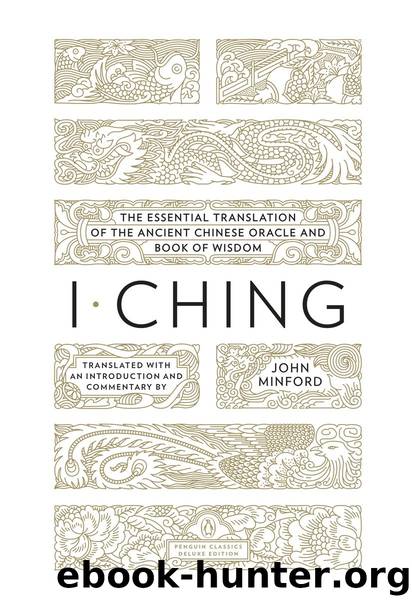I Ching by John Minford

Author:John Minford [Minford, John]
Language: eng
Format: epub
Publisher: Penguin Publishing Group
Published: 2014-10-30T04:00:00+00:00
Mountains are the preferred abode of the Taoist and Zen Recluse, as in the famous quatrain by the Tang-dynasty poet Jia Dao:
Seeking the Recluse and Not Finding Him
Beneath the pines,
I ask the boy,
Who tells me,
Master’s gone gathering herbs
On the Mountain.
Who knows where?
Somewhere,
Deep in the clouds.
In The Soul of China, Richard Wilhelm recalls this Hexagram in connection with Mount Tai, the Eastern Great Mountain of the Five Sacred Mountains (dongyue), worshipped as Gateway to the Underworld: “It is always an experience to go up this mountain. You continue to see its cloudy top rise up out of the host of the other hills, and it seems as if it were revealing a secret every time: the secret of the connection between life and death in that great Stillness whose symbol is the Hexagram Mountain.” For Chinese writers and painters alike, the Mountain is a place of pilgrimage, a place to be revered, a perpetual source of inspiration and elation, a “place of vision” from which to contemplate the Universe and its mysteries. The scholar and poet Qian Qianyi wrote eloquently of this: “I used to have no understanding of the respect due to that great peak Mount Tai. Now, as I start this journey, I am respectful and pure of mind, I am silent and filled with awe.” Mountains are both resting and arresting. They inspire and obstruct. They rise up grandly from the Earth, in quiet and solemn majesty; but they also halt the traveler’s onward progress. In this Gen Hexagram, Yang reaches upward from the top of each Trigram; the two Yin Lines below move downward. There is both Aspiration and Rest. Movement reaches its natural end in Stillness. The Hexagram points to Stillness and a quiet Heart-and-Mind. It recognizes the need for Movement, but only when the Time is right. The poet Ban Biao paraphrased the words of this Hexagram’s Commentary on the Judgment in his “Rhapsody on the Northward Journey”:
The Man of True Discernment . . .
Whether Moving or Still,
Whether curved or straight,
Is always in tune with Time.
He treads the path of Sincerity,
He can live in any place,
He fears not the wildest barbarian shore.
Download
This site does not store any files on its server. We only index and link to content provided by other sites. Please contact the content providers to delete copyright contents if any and email us, we'll remove relevant links or contents immediately.
| Anthropology | Archaeology |
| Philosophy | Politics & Government |
| Social Sciences | Sociology |
| Women's Studies |
The remains of the day by Kazuo Ishiguro(8999)
Tools of Titans by Timothy Ferriss(8396)
Giovanni's Room by James Baldwin(7346)
The Black Swan by Nassim Nicholas Taleb(7129)
Inner Engineering: A Yogi's Guide to Joy by Sadhguru(6796)
The Way of Zen by Alan W. Watts(6614)
The Power of Now: A Guide to Spiritual Enlightenment by Eckhart Tolle(5781)
Asking the Right Questions: A Guide to Critical Thinking by M. Neil Browne & Stuart M. Keeley(5775)
The Six Wives Of Henry VIII (WOMEN IN HISTORY) by Fraser Antonia(5515)
Astrophysics for People in a Hurry by Neil DeGrasse Tyson(5190)
Housekeeping by Marilynne Robinson(4447)
12 Rules for Life by Jordan B. Peterson(4304)
Ikigai by Héctor García & Francesc Miralles(4274)
Double Down (Diary of a Wimpy Kid Book 11) by Jeff Kinney(4272)
The Ethical Slut by Janet W. Hardy(4253)
Skin in the Game by Nassim Nicholas Taleb(4248)
The Art of Happiness by The Dalai Lama(4130)
Skin in the Game: Hidden Asymmetries in Daily Life by Nassim Nicholas Taleb(4007)
Walking by Henry David Thoreau(3962)
